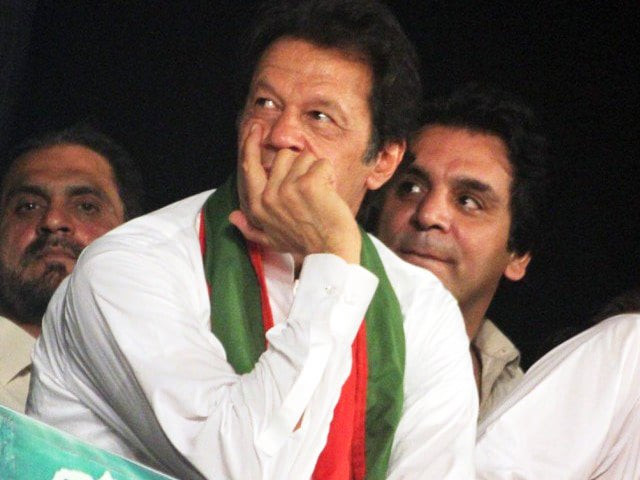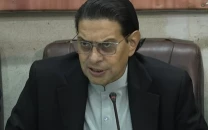Indecisiveness: ECP adjourns hearing in disqualification pleas
In a separate case concerning PM's son-in-law Captain Safdar, Salman Butt did not file a reply

Interestingly, PTI chief Imran Khan and secretary general Jahangir Tareen both facing similar charges came up with divergent views. PHOTO: APP
It has been more than three months since the disqualification references against the top leaders of the PML-N and the PTI landed in the Election Commission of Pakistan (ECP). Wednesday’s hearing did not turn out to be any different from the proceedings on similar petitions on the matter.
Defence counsels secured another adjournment on mere argument that they did not believe the ECP had the jurisdiction to hear such petitions.
Salman Aslam Butt, former Attorney General, appeared on behalf of the prime minister and his four close relative lawmakers facing charges of concealing their real wealth.
Butt filed replies on behalf of Shahbaz Sharif, his son Hamza Shahbaz, Ishaq Dar and Captain (retd) Muhammad Safdar in petitions filed by the PTI, PPP, PAT, AML and others implicating them along with Prime Minister Nawaz Sharif in offshore companies.
Butt claimed that he could not get the reply of the prime minister since he went to UN. The counsel contested the ECP’s powers to adjudicate references seeking disqualification of lawmakers on the ground and urged the commission to first decide if it was the proper forum to take up such cases.
Chief Election Commissioner Justice (retd) Sardar Muhammad Raza, a former judge of Supreme Court, directed him to file a reply of the prime minister by the next hearing fixed for October 10.
Heading the bench, comprising four members of the commission, the CEC remarked that they would decide the question of jurisdiction before moving further, but the respondents must file their replies first.
Interestingly, PTI chief Imran Khan and secretary general Jahangir Tareen both facing similar charges came up with divergent views.
Imran’s counsel argued that the ECP has all the authority to decide such cases while the viewpoint of Tareen’s lawyer appeared to be close to the stance taken by the prime minister’s lawyer.
Imran’s lawyer Bakhtiar Kasuri had exchanged heated arguments with the CEC during the proceedings. However, the CEC regretted his attitude.
In a separate case concerning Prime Minister’s son-in-law Captain Safdar, Salman Butt took the same stance and did not file a reply. Nawabzada Salahuddin Saeed, the PTI’s candidate in the 2013 general elections, was first to move the ECP. He had filed a petition against Safdar on May 21.
Some legal experts say the case against Safdar was most compelling since the name of Prime Minister’s daughter Mariam Safdar is directly mentioned in the Panama leaks.
Salahuddin’s counsel, Faisal Hussain argued that the continuous failure of the defendant to reply on changes levelled in his petition should be construed as an admission of the accusations on the part of the respondent.
The CEC directed Safdar’s counsel to file a reply before the next hearing, otherwise the commission would have no option but to allow the petition. Before Wednesday’s hearing, the ECP had already held three hearings in Safdar’s case all leading to adjournments. The ECP would take up it up along with other cases on October 10.
Published in The Express Tribune, September 29th, 2016.



















COMMENTS
Comments are moderated and generally will be posted if they are on-topic and not abusive.
For more information, please see our Comments FAQ